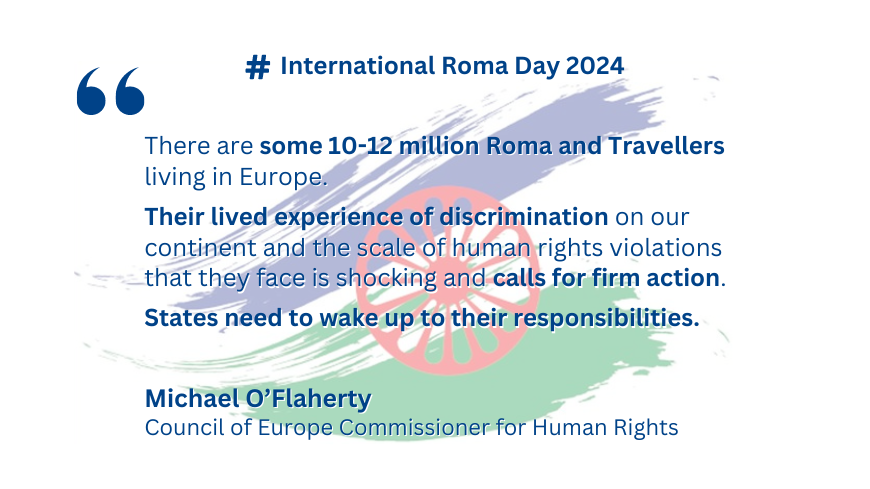«Дискриминация и масштабы нарушений прав человека, с которыми сталкиваются народ Рома и тревеллеры в Европе, шокируют и требуют решительных действий», - заявил сегодня Комиссар Совета Европы по правам человека Майкл О'Флаэрти в преддверии Международного дня Рома, 8 апреля.
Далее на английском языке.
“There are some 10-12 million Roma and Travellers living on our continent. Many of them face discrimination in all fields of life, from segregation and exclusion in housing and education to multiple barriers when accessing work, healthcare and goods and services, leading to their marginalisation and to poverty. Roma continue to suffer from widespread antigypsyism. This specific racism takes several forms ranging from daily anti-Roma discourse by ordinary citizens, politicians and the media to the most heinous ones such as hate crimes targeting Roma.
The pervasive discrimination and embedded prejudice against Roma and Travellers in today’s Europe are the result of centuries of violence, stigmatisation and inequality, from the times of slavery to the Roma Holocaust and pogroms, forced sterilisations of Roma women, the removal of children, forced evictions from houses and halting sites and ethnic profiling. The scapegoating of Roma in times of crisis is a recurrent phenomenon that was highlighted again recently in the context of the COVID-19 pandemic, which showed a surge in hate speech targeting Roma communities across Europe. Roma fleeing Russia’s war against Ukraine have been discriminated against when trying to access shelters and other forms of assistance.
The protection of the human rights of Roma and Travellers must become a top priority in our member states.
Firstly, they should acknowledge the extent of antigypsyism in our societies and the level of human rights violations resulting from it. Politicians should adopt a zero-tolerance policy towards hate speech against Roma. Everywhere, Roma and Travellers should have full access to justice in practice to remedy the human rights violations they have faced. This includes full implementation of Roma and Travellers-related judgments of the European Court of Human Rights.
Secondly, we should design rights-based policies at local, regional and national levels and adequately implement them to combat antigypsyism, discrimination and the marginalisation of Roma. In this context, it is crucial to foster the empowerment and participation of Roma and Travellers, including young people and women. We should work “with” Roma and Travellers, not “for” them.
Thirdly, member states should address the persisting lack of data on the situation of Roma within the Council of Europe space as it makes it impossible to measure the full extent of the human rights violations affecting them. This also means addressing the under-reporting to the authorities by Roma of these violations, by distributing information about available mechanisms for human rights protection, reinforcing mutual trust and improving the response of the authorities.
Finally, we must recognise, promote and, above all, celebrate Roma culture in all its diversity and Roma contributions to our societies not only on International Roma Day, but every day. Tools for raising awareness among the general population and teaching in schools about Roma culture, history and language should be developed and effectively implemented.
Much remains to be done to achieve the full equality and inclusion of Roma and Travellers in European societies. While there is hope for progress, there is also no time to lose. I will stand by Roma and Travellers and use my mandate to its fullest to support them to reclaim and enjoy human rights.”



